Meetings
Meetings are an important way in which the CPPCC exercises its functions and its members participate in the deliberation and administration of state affairs. The main meetings of the CPPCC National Committee include plenary sessions, meetings of the Standing Committee, Chair’s Council meetings, Secretaries-general’s meetings and meetings of special committees. In addition, workshops and consultative meetings on special topics, special briefings, evaluative meetings, public hearings and seminars are held in light of needs.
Plenary sessions are the highest form of consultation by the CPPCC. The Standing Committee of the CPPCC National Committee calls and presides over a plenary session, but the first session of the new term is chaired by the presidium elected at the preparatory meeting before the session. The plenary session is held once a year, generally in March in conjunction with the annual session of the NPC. A plenary session can be convened on an ad hoc basis if the Standing Committee of the CPPCC National Committee deems it necessary. A session can be held when over two-thirds of the CPPCC members attend.
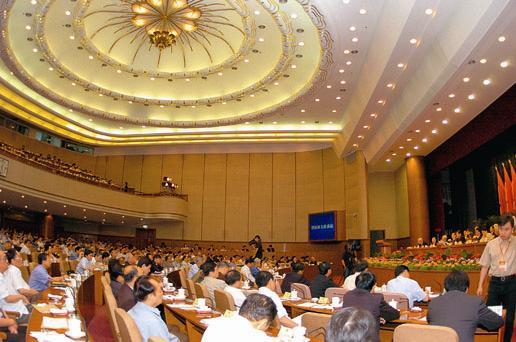
The Standing Committee of the CPPCC National Committee in a meeting
The agenda of the plenary session mainly includes opening and closing ceremonies, meetings to hear speeches, joint-group and group discussions, and attending the session of the annual NPC as nonvoting observers.
The main tasks of the plenary session are to elect the Chairperson, Vice-chairpersons, Secretary-general and members of the Standing Committee of the CPPCC National Committee, and decide on increases or changes in the composition of the Standing Committee of the CPPCC National Committee; to make suggestions and criticisms by consulting on and discussing the state’s major principles and policies, and crucial issues affecting political, economic, cultural and social activities; to listen to and examine the work report of the Standing Committee of the CPPCC National Committee, and the report on handling proposals and other reports; to listen to and discuss the Report on the Work of the Government, the Report on the National Planning and Budget, the Report on the Work of the Supreme People’s Court, the Report on the Work of the Supreme People’s Procuratorate and other important reports and make comments and suggestions on them.
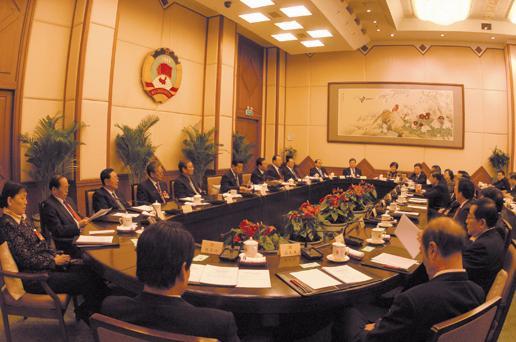
The Chair' Council of the CPPCC National Committee holds a meeting.
At a plenary session, meetings to hear speeches are convened. All political parties, mass organizations, groups and special committees are entitled to present written speeches by individuals or groups of members. The Secretariat of the plenary session will then decide who will speak at the meetings, according to relevant regulations.
Members attending the plenary session are divided into section according to their groupings. The leader, recommended by the members of a section presides over the meeting while the convener of the section will chair the meeting until the leader is chosen. A joint discussion can be attended by members of different groups. The person who presides over the discussion is chosen through recommendation by all attending the discussion.
The leading members of the CPC Central Committee, the Standing Committee of the NPC, the State Council, the Central Military Commission, the Supreme People’s Court and the Supreme People’s Procuratorate are invited to attend the plenary sessions, of the CPPCC,and the diplomatic envoys and press officers of all countries to China are invited to attend it as observers.
Meetings of the Standing Committee are the main form of the CPPCC’s performance of its functions of political consultation, democratic supervision and participation in the deliberation and administration of state affairs when a plenary session is not in session. They are responsible for calling and presiding over the meetings of the CPPCC National Committee and handling its work when its plenary session is not in session.
The Chairperson of the National Committee presides over the meetings of the Standing Committee or entrusts Vice-Chairpersons to chair them. Generally speaking, the Standing Committee meets every quarter of the year. Ad hoc meetings may be held if necessary and only over two-thirds of all members of the Standing Committee are prepared to attend.
Normally, meetings of the Standing Committee last three to four days. Their agenda mainly includes opening and closing ceremonies, meetings for speeches, listening to reports or briefings, group discussions based on special topics, regular group discussions, etc. Their main tasks are to examine the important affairs concerning the conference business and work of the CPPCC National Committee and its Standing Committee; to consult on and discuss the state’s general principles and policies, and the major issues affecting the national economy and the people’s livelihood by listening to reports and explanations of major issues made by the leading members of the CPC Central Committee, the State Council and relevant government departments; to examine the documents submitted to the plenary session of the CPPCC National Committee; to examine important motions, proposals, inspection reports, investigation reports, reports on visits to foreign countries and other reports; to study important matters concerning the CPPCC’s work; to consult and decide on the units, the number of members, candidates and groups of the next National Committee; and to consult and decide on increases or changes in the groups, and the number of members and candidates of the current National Committee.
Only if the proposals made at meetings of the Standing Committee or other matters which require voting are adopted by half of all members of the Standing Committee can they become valid.
Meetings of the Chair’s Council are the CPPCC’s main form of consultation when meetings of the Standing Committee are not in session. Composed of the Chairperson, Vice-chairpersons and Secretary-general of the CPPCC National Committee, they are responsible for handling the important day-to-day work of the Standing Committee. They are called and presided over by the Chairperson or Vice-chairpersons entrusted by the Chairperson. Generally speaking, they are held once a month, although ad hoc meetings can be convened if necessary and only over half of all the council members are prepared to attend.
Their main tasks are to discuss increases or changes in the groups, the number of members and candidates of the current National Committee and ask the Standing Committee to make decisions through consultation; to discuss the units, the number of members, candidates and groups of the next CPPCC National Committee, and ask the Standing Committee to decide via consultation; to discuss the state’s general principles and policies and the major concerns of the people, during which the leaders of relevant departments are invited to the meeting to give information and hear opinions; to examine important suggestions made to the CPC Central Committee and the State Council in the name of the CPPCC National Committee or its Standing Committee; to draft the agendas and schedules of meetings of the Standing Committee; to call and preside over meetings of the Standing Committee, draft their agenda and schedule and examine the documents submitted to the meetings; and to implement the resolutions of the Standing Committee and handle its important day-to-day work.
Proposals
Proposals refer to written comments and suggestions which are made to a plenary session of a CPPCC committee or its Standing Committee by members of a CPPCC committee, political parties or mass organizations affiliated with the CPPCC or special committees of the CPPCC and which are examined and put on file by the Committee for Examining Proposals or the Committee for Handling Proposals before they are handled by relevant departments.
Generally speaking, there are four ways to make proposal. First, CPPCC members can make a proposal individually or jointly. Second, during the convocation of a plenary session, a group or a number of groups can make a proposal. Third, a political party or mass organization which is a member of the CPPCC can make a proposal. Fourth, any special committee of a CPPCC committee can make a proposal.
The basic procedures for handling the proposals are presenting the proposals, forwarding them, handling them, and giving replies to the proposal presenters. Upon receiving proposals, the Committee for Examining Proposals or the Committee for Handling Proposals shall examine them and put the approved ones on file based on the principles of respecting and safeguarding the democratic rights of the presenters and ensuring the quality of proposals. According to the content of proposals and the specification of responsibilities of relevant government departments, the units for handling the proposals which have been examined and put on file are determined. The relevant departments of the CPC, state organs, army units, mass organizations concerned and other departments shall handle the proposals in accordance with state laws and regulations, policies and pertinent provisions. When a proposal is handled, the responsible unit shall reply in written form directly in the specified time frame to the first person who presented the proposal and at the same time send a copy of the reply to the office of the committee for handling proposals. If a presenter does not receive a written reply within the specified time, he/she can inquire about it to the office of the committee for handling proposals.
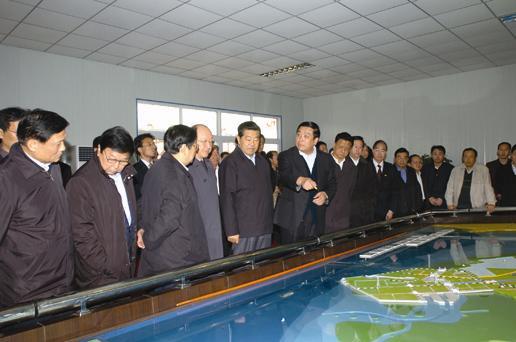
Jia Qinglin,Chairman of the CPPCC National Committee leads an inspection of the relocation of the Shougang Group and its new construction site at Caofeidian.
Inspections by Members Inspections by members of CPPCC committees are carried out outside plenary sessions. The CPPCC committees at different levels organize their members to go to the grassroots to make inspections, offer suggestions and opinions, report on social conditions and popular sentiments, and exercise democratic supervision over the implementation of the state’s major principles and policies, the planning and construction of important projects in economic and social development and major issues of concerns to the people.
The main targets of inspection by members of CPPCC committees include the implementation of the Constitution of the People’s Republic of China, its laws and regulations and major principles and policies; achievements scored in reform, opening-up and the socialist modernization drive; major issues arising in political, economic, cultural and social activities; and the performance of state organs and their functionaries.
Special Investigations and Studies
The CPPCC’s special investigations and studies are conducted by special committees. Focusing on the state’s central tasks, the special committees organize their members to select a special topic according to priorities, and offer opinions and suggestions to the CPC and state departments for decision-making reference after investigation and study. The latter are an important means to enable CPPCC members to get into the real situation, maintain ties with the people, learn about the implementation of the CPC and state’s principles and policies, and collect and report on social conditions and popular sentiments. They are also necessary preparations and important basic work for CPPCC members’ participation in the deliberation and administration of state affairs.
Reporting on Social Conditions and Popular Sentiments
The work of reporting on social conditions and popular sentiments is routine and basic. Focusing on major national principles and policies and the problems which the CPC and the state attach importance to and the people are concerned about, CPPCC committees at all levels organize all political parties, mass organizations, and personages from all ethnic groups and circles affiliated to the CPPCC to report on important matters to the CPC and government and relevant departments, to air their opinions and make suggestions after collection and analysis of information through the CPPCC’s special channels so as to help leading organs to analyze the situation and make effective policy decisions.
Promoting Peaceful Reunification of the Motherland
The CPPCC’s main efforts to promote peaceful reunification of the motherland include publicizing and carrying out the principles and policies concerning reunification of the motherland; getting acquainted with and studying important matters concerning political, economic and social activities and other areas in Taiwan; getting to know and reporting on the views and suggestions of personages of all circles from Hong Kong, Macao and Taiwan, as well as overseas Chinese, about the construction and peaceful reunification of the motherland; making contacts and friends with compatriots in Hong Kong, Macao and Taiwan, overseas Chinese and foreign citizens of Chinese descent; and promoting cross-Straits people-to-people contacts and exchanges in economic, cultural the Taiasan and other areas.
The main channels for the above-mentioned efforts are the expansion of friendly contacts with compatriots in Hong Kong, Macao and Taiwan and overseas Chinese by means of visits and invitations, including the invitation of selected figures from the above circles to attend various important commemorative activities in China,s mainland including activities organized by the CPPCC.
Contacts and Exchanges with Other Countries
The CPPCC’s contacts and exchanges with other countries are an important component of China’s overall diplomacy. The CPPCC, guided by China’s diplomtic policies and endeavors to strengthen friendly contacts, exchanges and cooperation with all countries in the world, safeguarding world peace and promoting common development.
The CPPCC’s contacts and exchanges with other countries have the following characteristics:
1. They are extensive and rich in content covering political, economic, cultural and social activities;
2. They contribute to increasing mutual understanding, removing misunderstanding and expanding cooperation with ¬¬personages from different social systems, lifestyles and ideologies in all countries in the world, and introducing the positions, principles and policies of the CPC and the Chinese government.
The CPPCC’s contacts and exchanges with other countries are conducted in the following ways: exchanges of good-will visits between the leaders of the CPPCC National Committee and those of relevant organs in other countries; contacts and exchanges between the CPPCC National Committee and relevant organs in other countries; sponsoring international forums in China or attending forums abroad ; and exchanges and cooperation conducted by the China Economic and Social Council (CESC)and the China Committee on Religion and Peace(CCRP).
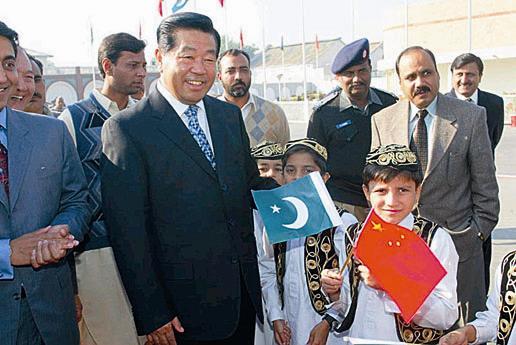
The CPPCC National Committee is active in developing contacts and exchanges with other countries.
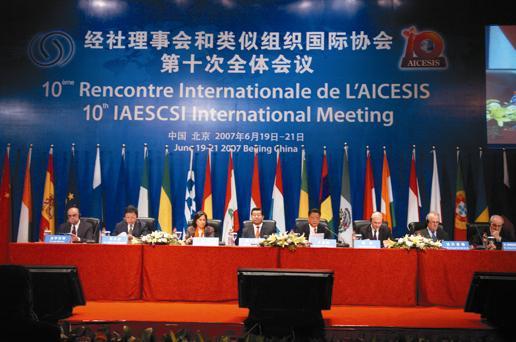
The 10th IAESCSI International Meeting sponsored by the China Economic and Social Council was held in June 2007 in Beijing.
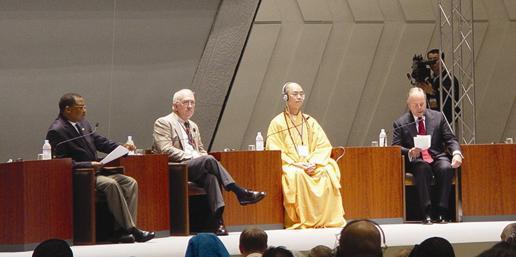
At the plenary session of the 8th World Conference on Religion and Peace (WCRP) held in August 2005 in Kyoto, Japan, Xue Cheng, Deputy Secretary-general of the China Committee on Religion and Peace (CCRP) spoke on behalf of the CCRP.





